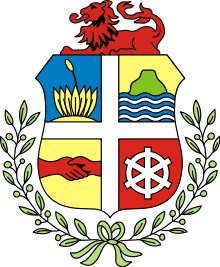Politics of Aruba
Aruba, a constituent country of the Kingdom of the Netherlands, takes place in a framework of a parliamentary representative democratic country, whereby the prime minister is the head of government, and of a multi-party system. Executive power is exercised by the government. Federal legislative power is vested in both the government and the Estates. The Judiciary is independent of the executive and the legislature. Aruba has full autonomy on most matters. Exceptions are defence, foreign affairs, and the Supreme Court. The constitution was enacted in 1986.
 |
|---|
| This article is part of a series on the politics and government of Aruba |
|
Executive
Executive power rests with the Governor of Aruba, the prime minister and other cabinet ministers exercises executive power on behalf The governor. the Governor is appointed for a six-year term by the monarch.
Legislature
The Estates have 21 members, elected for a four-year term by proportional representation. Each member holds their seats until Parliament is dissolved which is every four years by a general election. The leader of the party who gains majority usually becomes the Prime Minister.
Judicial
Aruba's judicial system, which has mainly been derived from the Dutch system, operates independently of the legislature and the executive. Jurisdiction, including appeal, lies with the Common Court of Justice of Aruba and the Netherlands Antilles and the Supreme Court of Justice in the Netherlands.